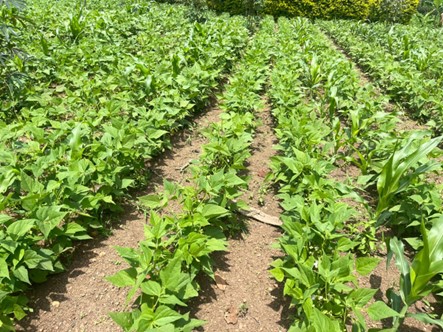Story
It’s not easy to grow the food your hungry family needs, even in Kashare, SW Uganda where there are two growing seasons each year. Women are responsible for growing basic food crops – maize, beans and peanuts. Some have access to land; others must rent it.
Despite being in an agricultural area, years of poor soil management mean that in some fields crops don’t grow well. If you are poor and don’t have much money for rent, you may not be able to afford to rent a field with good soil. You’ll have to mulch the soil or use expensive inorganic fertilisers to get good yields.
You grow what you know. Maize is the staple grain, and most people want to grow it. But maize is at its limit in Kashare; it takes so much out of the soil and needs a lot of water. Millet is an alternative to maize, and it is native to Uganda, but not as popular to eat. It is much less susceptible to the unpredictable rains which people say are becoming more common and attributing to climate change. At least peanuts and beans which everyone grows and are nutritious put some nitrogen back into the soil.
Torrential downpours, now more frequent, can wash seeds and soil away on Kashare’s sloping fields. Contouring can really help. Other times the rains don’t come at all, and it is important to plant climate-resilient crops.
You sow seeds the way you’ve always done it by broadcasting. But it makes it hard to pick the weeds out. And is it worth the effort? Sowing in rows and weeding increases crop productivity – but you are going to want to see the benefits before committing to all that back breaking work. Demonstration plots are a way to show this.
And what about selling your surplus to make some cash to pay for school uniforms etc? It is so tempting to sell to the middleman who comes ahead of harvest and offers to take your crop off your hands. But he doesn’t give you a good price.
This is where KICS comes in. We have hired a young agricultural extension worker, Allan, who is working with 100 poor women subsistence farmers to build on their knowledge and introduce appropriate and climate-friendly farming techniques on demonstration plots. We give good quality seeds at the beginning to show what a difference they can make. We encourage the women to carefully sort their surplus crops for sale. The best kernels, grains, beans and peanuts fetch the best prices. KICS collects the surpluses together and the group sells them when the price is good. Women are organising themselves into groups which can collectively buy good seed and sell in bulk when the prices are higher. It makes a difference.
£10 – will buy seeds for one farmer for a year (two seasons)
£30 – 10 bags to store one of the group’s grain crops prior to marketing
£50 – tools for one demonstration plot
Thank you for your support.

 Campaign by
Campaign by 